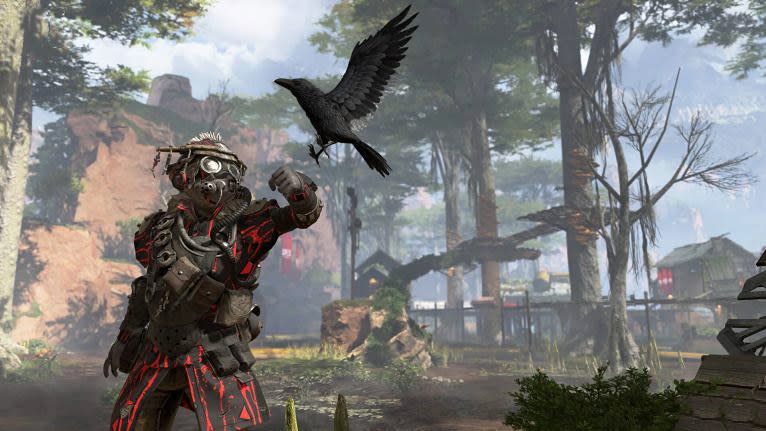Apex Legends Beats Fortnite at Its Own Game

These days, there's nothing video games love more than dropping you on an island with a horde of strangers and watching as you all scramble to kill each other for sport. Apex Legends, the new, free game that dropped completely by surprise on PlayStations, Xboxes, and PCs everywhere last week, is the latest entry in the medium's battle royale craze. It's a growing genre of games that are essentially Hunger Games simulators, tasking players with being the last one standing so they can kiss Josh Hutcherson or something.
For the past year, Fortnite has been the reigning champ in this arena, largely because it is free and limber, made by one of the biggest game studios in the business working tirelessly to add new things to the mix. Many have tried to come for its crown: Call of Duty: Black Ops 4 added its take, Blackout, last fall. H1Z1, formerly a game about surviving the zombie apocalypse, pivoted to become a a battle royale game. And the progenitor of the battle royale game, PlayerUnknown's Battlegrounds has hustled to add new maps and modes in order to compete with Fortnite, the game that ate its lunch. But despite the simplicity of the battle royale format, none of these games have succeeded in their efforts to stage a gaming coup, failing to grab a hold of the je ne sais quois that makes for the kind of gamer aphrodisiac that drew them to Fortnite. Apex Legends, though? Apex Legends may do it—partly because it is also free, but mainly because it is a better game.
As far as titles go, Apex Legends isn't terribly exciting. It sounds like the sort of made-up game Ice-T's Odafin "Fin" Tutuola would be heavy into on an episode of Law & Order: SVU. But as far as battle royale games go, Apex Legends is incredible, benefitting from (1) being a latecomer to the genre, nimble enough to address the ways others fall short, and (2) being made by Respawn Entertainment, the studio responsible for Titanfall 2—perhaps the last truly great big-budget shooter—and a team that very clearly pays a lot of attention to how people play shooters. Apex Legends is a patchwork game, taking a little bit from a bunch of shooters and welding them together into something bulletproof. But like any good remix, it has plenty of its own ideas.
Apex Legends is full of thoughtful little tweaks, like the way it's built for antisocial misanthropes like myself, people who understand the value of teamwork as a concept but aren't really interested in putting on a headset to talk to strangers. To that end, Apex lets you ping everything with a single button. If you're pointing at a general direction, it'll tell your teammates you think that's a good spot to check out. If you point at some ammo and hit it, it'll let them know where it is and what type. (They can then hit another button and thank you.) If you're pointing at an enemy, now everyone knows where danger lies. It's a brilliant way to communicate all the things I'd ever want to say to a stranger online, and now I don't even have to say them. It's like when Gmail started autocompleting emails for me—an extremely nice feature to have that makes it that much harder to tell if I were to ever be killed and replaced by a robot.
This is why I would suggest you try Apex Legends even if battle royale games aren't your bag. It's thoughtful in the ways it lets you interact with other people, offering a cast of colorful, diverse characters you can choose from, each with unique powers that allow you to play in slightly different ways. You can be as much of a team player as you want to be, while also holding the potty-mouthed anonymous strangers of the world at bay. And it doesn't hurt that it's a first-person shooter made by some of the finest purveyors of first-person shooting in the business.
The battle royale game format is maybe the most significant development in shooting games since team deathmatch, the main way first-person shooters have let you play with others online since Quake. Everyone, as we've established, is doing it—and more will try still. (Last fall's Battlefield V has been hyping the launch of its take, Firestorm, for months now.) Games haven't had a legitimate gold rush this big in ages, and it's reshaping the mainstream face of the industry. This is why it's worth paying attention to games like Apex Legends even if it turns out you don't like it.
As a video game, Apex Legends is tremendous, a fantastic refinement of a rock-solid game genre that speaks to the current streamer-heavy, esports-friendly zeitgeist. But it's also, like Fortnite, a free-to-play game from a big publisher jockeying for command of the game industry's enormous profits—and full of tremendously successful, morally dubious techniques for separating people from their money. Like Fortnite, Apex Legends will soon offer a battle pass that, for a fee, will provide players with more rewards for playing. There will also be new characters that can be unlocked with money. And there are already the loot boxes—ubiquitous in video games—you can purchase for random sets of cosmetic swag for your characters, and a hit of dopamine.
This is not a warning about change coming, but about change that's already here. Apex Legends, and games like it, are the new normal in big-budget video games. Find the fun where you can get it, and try not to gamble any money on loot boxes. That shit's a slippery slope.

